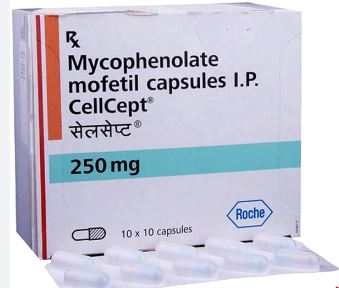CELLCEPT 250MG CAPSULE
Same day
Introduction:
Cellcept 250mg capsule contains the active ingredient Mycophenolate mofetil. It is an immunosuppressant used to prevent and treat organ rejection in patients receiving allogenic, kidney, heart, or liver transplants. It is indicated along with other immunosuppressants to avoid the rejection of the transplanted organ.
Inform your doctor immediately if there are any signs of fever, sore throat, bleeding, or stomach ulcer. Talk to your doctor before getting vaccinated using live vaccines. Men using Cellcept 250mg capsule must not donate sperm during the treatment and must avoid it for at least 90 days after the end of the treatment.
Immunosuppressants increase the risk of skin cancer. Limit your exposure to the sun, wear protective clothing and use a sunscreen with high SPF. Cellcept 250mg capsule can cause defects in the foetus and miscarriages; hence do not start treatment with this medication without informing your doctor.
Effective contraception must be followed before, during, and till six months after the end of treatment with Cellcept 250mg capsule. Diarrhoea, constipation, nausea, vomiting, stomach pain, dizziness, and headache are some common side effects of this medication.
Uses of Cellcept 250mg capsule:
- Prevention of organ rejection after organ transplantation (liver, kidney or heart)
- To prolong the survival of the transplanted organ.
- Prophylaxis and treatment of acute and chronic Graft versus Host disease in hematopoietic stem cell transplant patients.
How Cellcept 250mg capsule Works:
Cellcept 250mg capsule converts into its active form known as Mycophenolic acid and suppresses the production of T- and B-cells. This reduces the cell-mediated immune responses and antibody formation.
Interaction with other drugs:
Inform your doctor about any medications you are taking or have taken before the treatment.
How to store Cellcept 250mg capsule:
Store Cellcept 250mg capsule protected from light at a temperature not exceeding 30°C.
References:
- Roche Products Limited, European Medicine consortium (emc), [Revised on Jan 2022],[Accessed on 01/07/2022], https://www.medicines.org.uk/emc/files/pil.1103.pdf
- Genentech USA, Inc., [ Revised on Oct 2021] [ Accessed on 1/07/2022], https://www.gene.com/download/pdf/cellcept_prescribing.pdf
- S.E. Marshall, Immunological Factors in disease, Davidson’s Principles and Practice of Medicine, 22nd Edition, 2014, 71-96.
- KD Tripathi, Immunosuppressant Drugs, Essentials of Medical Pharmacology, 8th Edition, 2019,.937-945.
- Ahmed A. Negm & Daniel E. Furst, Nonsteroidal Anti-Inflammatory Drugs, Disease-Modifying Antirheumatic Drugs, Nonopioid Analgesics, & Drugs Used in Gout, Lange’s Basic & Clinical Pharmacology, 14th Edition, 2018, 642-666.
Disclaimer: City Medicine Corner primary intention is to ensure that its consumers get information that is reviewed by experts, accurate and trustworthy. The information and contents of this website are for informational purposes only. They are not intended to be a substitute for professional medical advice, diagnosis, or treatment. Please seek the advice of your doctor and discuss all your queries related to any disease or medicine. Do not disregard professional medical advice or delay in seeking it because of something you have read on City Medicine Corner. Our mission is to support, not replace, the doctor-patient relationship.
Enquiry Now
